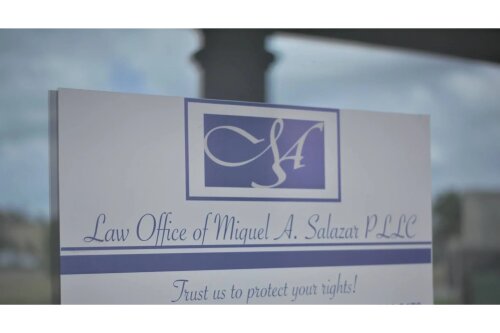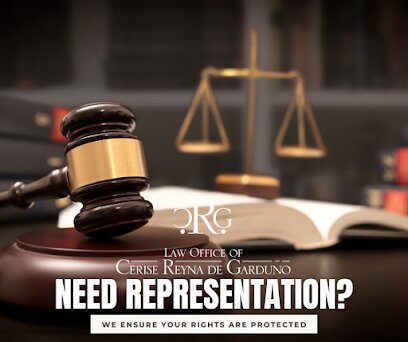Best White Collar Crime Lawyers in Brownsville
Share your needs with us, get contacted by law firms.
Free. Takes 2 min.
List of the best lawyers in Brownsville, United States
About White Collar Crime Law in Brownsville, United States
White collar crime generally refers to non-violent, financially motivated offenses such as fraud, embezzlement, tax crimes, money laundering, identity theft, securities violations, and certain computer-related offenses. In Brownsville - which lies in Cameron County, Texas - these cases can be handled under state law or under federal law depending on the facts, the dollar amounts involved, and whether interstate activity or federal statutes are implicated.
State-level investigations and prosecutions are typically handled by local law enforcement and the Cameron County District Attorney. Federal investigations are handled by agencies such as the Federal Bureau of Investigation, the Internal Revenue Service - Criminal Investigation, and the U.S. Attorney's Office for the Southern District of Texas. Administrative and regulatory agencies may also open parallel investigations - for example the Securities and Exchange Commission or state regulators - when professional rules or licensing issues are involved.
Why You May Need a Lawyer
You may need a lawyer if you are under investigation, have been arrested, have been served with a subpoena, have been indicted, or have been notified of a regulatory or civil enforcement action. White collar matters involve complex evidence - bank records, email and electronic records, financial statements, regulatory filings, and forensic accounting - and mistakes early in the process can lead to charges, pretrial detention, asset freezes, or significant civil liability.
A lawyer experienced in white collar defense can help you assess exposure, protect your rights during interviews, negotiate with prosecutors or regulators, preserve or recover seized assets, challenge improperly obtained evidence, evaluate plea bargain or diversion options, and represent you at trial if necessary. Early legal representation also helps manage potential collateral consequences - loss of professional licenses, employment termination, or civil suits from victims or regulators.
Local Laws Overview
Key local aspects to understand if you are facing white collar allegations in Brownsville include these points:
- Dual jurisdiction - Many white collar offenses may be prosecuted by the state of Texas, Cameron County, or the federal government. The choice of federal versus state prosecution affects procedures, potential penalties, and investigative resources.
- Offense classification - Under state and federal systems, penalties vary by the type of charge and factors such as the amount of loss, number of victims, scope of the scheme, and prior criminal history. Convictions can lead to fines, restitution orders, probation, or imprisonment, and may include civil monetary penalties.
- Asset restraints and forfeiture - Law enforcement and prosecutors often seek asset freezes and forfeiture when crimes involve proceeds or instrumentalities of illegal activity. That can affect bank accounts, real estate, vehicles, and business assets.
- Investigative tools - Authorities commonly use subpoenas, search warrants, grand jury subpoenas, and cooperation demands. Electronic discovery is central - emails, cloud storage, transaction logs, and phones are often collected and forensically analyzed.
- Regulatory enforcement and licensing - Professional licensing boards, state agencies, and federal regulators can pursue administrative actions or civil enforcement separate from criminal prosecutions. Loss of professional licenses or civil penalties can follow criminal charges or independent investigations.
- Civil exposure - Victims of fraud may bring civil lawsuits seeking restitution, damages, or injunctive relief regardless of criminal outcomes. Civil standards of proof are lower than criminal standards.
- Statutes of limitations and procedural rules - Time limits for bringing charges and special procedural rules vary by offense and by whether the case is state or federal. These rules can be complex and can affect defenses and strategy.
Because local practice and prosecutorial priorities can vary, it is important to consult an attorney familiar with Cameron County and the Southern District of Texas to understand how these general rules apply to a specific case.
Frequently Asked Questions
What exactly counts as a white collar crime?
White collar crimes usually involve deception, breach of trust, or misuse of position for financial gain. Typical examples include various kinds of fraud (mail, wire, bank, insurance, mortgage), embezzlement, tax evasion, identity theft, money laundering, securities fraud, bribery, and certain computer-related offenses. The legal elements vary by statute and jurisdiction.
How do I know whether my case will be handled by state or federal authorities?
Jurisdiction depends on the facts of the alleged conduct. Federal jurisdiction is more likely when the conduct crosses state lines, uses interstate communications or banking systems, involves federal institutions, or violates a federal statute. Local law enforcement and the county district attorney handle many smaller-scale frauds and thefts under state law. A qualified attorney can review the facts and advise which authorities are likely to be involved.
What should I do if law enforcement contacts me or asks to question me?
If investigators contact you, remain calm and be polite, but do not provide substantive answers without first consulting a lawyer. You have the right to remain silent and the right to counsel. Asking to speak with an attorney before answering questions protects you from making statements that could be used against you later. If you are arrested, exercise your right to counsel immediately.
Can white collar charges be dropped or reduced?
Yes. Charges may be dropped or reduced for many reasons - insufficient evidence, successful pretrial motions, prosecutorial discretion, or as the result of negotiated plea agreements. Prosecutors sometimes offer deferred prosecution, non-prosecution agreements, or diversion programs in appropriate cases, particularly for first-time offenders or matters involving restitution and cooperation.
What defenses are commonly used in white collar cases?
Common defenses include lack of intent or knowledge, mistaken identity, lack of jurisdiction, mistakes in accounting or bookkeeping, entrapment, insufficient evidence, and constitutional violations such as unlawful search and seizure. The right defense depends on the charge and the available evidence.
Will I go to jail if charged with a white collar offense?
Potential penalties range widely. Some cases result in probation, fines, community supervision, or diversion; others may carry prison time. Factors such as the offense classification, the amount of loss, prior criminal history, and cooperation with authorities influence sentencing. An experienced lawyer can evaluate the likely exposure and possible mitigation strategies.
What are the potential civil or professional consequences?
Beyond criminal penalties, you may face civil lawsuits from victims or regulators seeking restitution or damages. Professional consequences may include disciplinary actions, loss of licenses, or administrative fines from state licensing boards or federal regulators. These collateral consequences can affect employment and future opportunities.
How long does a white collar investigation or case usually take?
Timing varies significantly. Some investigations conclude in weeks or months, while complex cases involving extensive financial records, multiple jurisdictions, or grand jury proceedings can take many months or years. Delays can occur during discovery, motion practice, plea negotiations, or trial scheduling.
How do I choose the right lawyer for a white collar matter?
Look for a criminal defense attorney with specific experience in white collar cases and familiarity with local courts and federal practice in the Southern District of Texas. Ask about their track record handling similar charges, experience with forensic accounting and electronic evidence, trial experience, and strategy for negotiation versus trial. Discuss fees, billing structures, and who on the defense team will do the work.
What should I preserve or gather right away if I suspect I am under investigation?
Preserve documents and electronic records that may be relevant - bank and credit card statements, contracts, invoices, emails, text messages, business records, accounting files, and copies of any notices or subpoenas. Avoid deleting files, altering records, or attempting to obstruct an investigation. Make a list of potential witnesses and relevant dates. Share this information with your lawyer so they can advise on legal preservation duties and next steps.
Additional Resources
Below are agencies and organizations that commonly handle or provide information about white collar matters in Brownsville and the surrounding region:
- Brownsville Police Department
- Cameron County District Attorney
- U.S. Attorney's Office - Southern District of Texas
- Federal Bureau of Investigation (FBI)
- Internal Revenue Service - Criminal Investigation (IRS-CI)
- Securities and Exchange Commission (SEC) - regional offices and enforcement
- Texas Attorney General
- Texas Department of Banking and Texas State Securities Board for regulatory matters
- Texas RioGrande Legal Aid - for certain civil legal services and referrals
- Texas State Bar - lawyer referral services and resources on finding qualified counsel
- Cameron County courts and Brownsville municipal courts - for procedural and filing information
Next Steps
If you believe you are under investigation or face allegations, take these practical steps:
- Stop communicating about the matter publicly or on social media.
- Do not voluntarily speak to investigators without an attorney - politely decline and request counsel.
- Begin preserving relevant documents and electronic records; avoid deleting or altering files.
- Contact a criminal defense lawyer with white collar experience for an initial consultation. Prepare a timeline of events and bring any notices, subpoenas, or communications you have received.
- Ask prospective lawyers about their experience with similar cases, approach to defense, fee structure, and whether they have used forensic accountants or electronic discovery specialists.
- Consider whether you may need separate civil or regulatory counsel in addition to criminal defense counsel.
- If assets are at risk of restraint or forfeiture, discuss immediate steps to protect business operations and personal finances with counsel.
- Keep detailed records of all hires, payments, communications, and professional interactions related to the matter - these records often become critical evidence.
This guide is informational and does not constitute legal advice. For advice tailored to your situation, consult an attorney experienced in white collar defense in Brownsville and the Southern District of Texas.
Lawzana helps you find the best lawyers and law firms in Brownsville through a curated and pre-screened list of qualified legal professionals. Our platform offers rankings and detailed profiles of attorneys and law firms, allowing you to compare based on practice areas, including White Collar Crime, experience, and client feedback.
Each profile includes a description of the firm's areas of practice, client reviews, team members and partners, year of establishment, spoken languages, office locations, contact information, social media presence, and any published articles or resources. Most firms on our platform speak English and are experienced in both local and international legal matters.
Get a quote from top-rated law firms in Brownsville, United States — quickly, securely, and without unnecessary hassle.
Disclaimer:
The information provided on this page is for general informational purposes only and does not constitute legal advice. While we strive to ensure the accuracy and relevance of the content, legal information may change over time, and interpretations of the law can vary. You should always consult with a qualified legal professional for advice specific to your situation.
We disclaim all liability for actions taken or not taken based on the content of this page. If you believe any information is incorrect or outdated, please contact us, and we will review and update it where appropriate.










